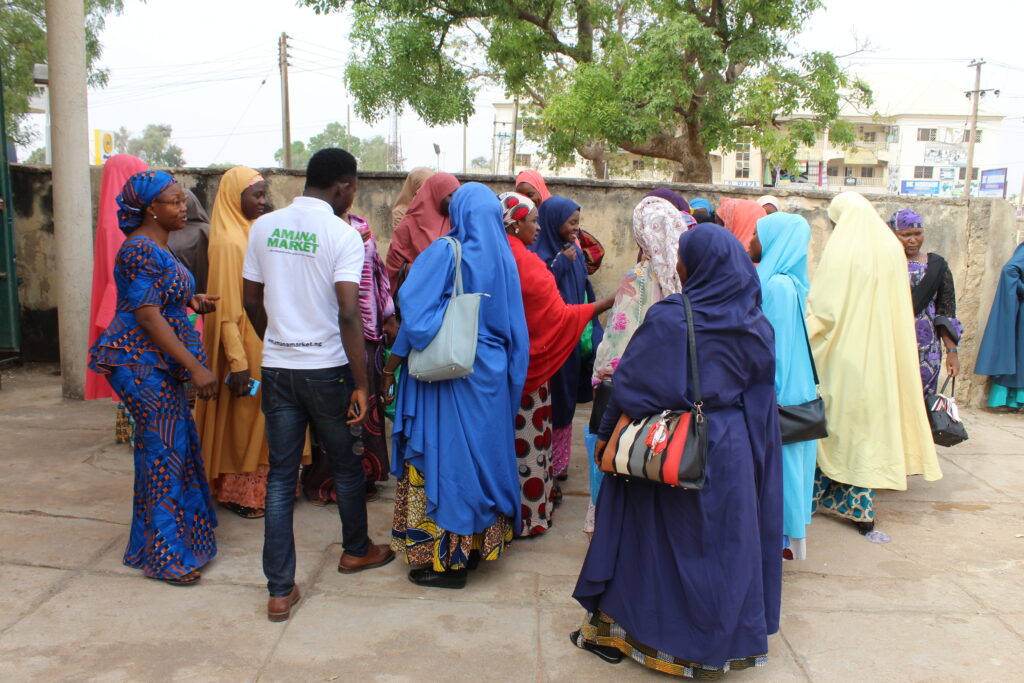A man walks to a stall in the market, he purchases foodstuff he expects to last his family the whole month and realizes he needs more cash. Leaving his goods there, he tells the trader he will be right back. He walks off leaving his goods and cash with the trader. He is not concerned about losing his goods or hard-earned cash. He goes off to return at an unspecified time.
A mother of 3 does her monthly shopping at an adjacent stall. She makes purchases worth ₦24,700 and hands over ₦25,000. Her change is ₦300. The trader doesn’t have smaller bills so she leaves the change with him and tells him “Ba komai” (no problem), “sai wata mai zuwa in sha Allah” (see you next month God willing)
A lady sends her teenage younger sister to the market to buy some urgent condiments for her, she had just started cooking lunch when she realized she was out of certain items she needed. On getting to the market, the sister hurriedly picks up the items and rushes out of the store dropping a ₦1,000 note on the table. The trader sharply calls her back, hands her back the money and tells her to remind her sister that 2 weeks ago she had overpaid for certain items so she didn’t need to pay for these. Neither sister remembers the transaction but both are grateful for the surplus.
————–

These transactions and many more like them are the backbone of commerce in Northern Nigeria. The unwritten rules and arrangements that drive microeconomics within our society. Strangers are always baffled when they observe these “exotic” practices which are never backed by any documentation, but having delved deep into the system with many stakeholders, the answer is always the same… AMANA.
“AMANA”, means “trust” in Hausa. But more than that it represents a moral code which must be upheld for any society to flourish. For centuries, the people of what is now northern Nigeria established and maintained economic relationships based on Amana. The ability to trust that everyone is acting in good faith is fundamental to these societies which form the core of CoAmana’s focus area. Our most active state in Nigeria is Kano state, unsurprisingly named the “Center of Commerce”, for its bustling activity and wide influence in the West Africa region. Almost all economic activity in these societies are Amana-based systems which is why you find every market having some sort of honour system in place that serves as a foundation for all trading.
How do you digitize a process which has been in place for so long and which serves the markets so well without digitizing the market itself? That is a question we constantly chew on at CoAmana. While digitizing the entire market operations is out of the scope of our current roadmap, we have built a foundation on which any future digitization can sit. What we have done is to attempt to digitize ‘trust’. By mimicking the established hierarchies in the market, we created a digital solution which optimizes processes within the markets and critically strengthens market linkages. We incorporated the markets, market clusters, market leaders, traders & farmers as entities on our platform and developed robust tools for each entity unique to their requirements. Our suite of web, mobile and offline tools are built to subtly fit into the existing market operations and eventually become the critical infrastructure of the various operations. This approach has enabled us to record tremendous successes in bringing the markets into the digital age.
As expected, one of the obstacles we consistently face when activating a new market is establishing trust. Before we talk about technology or innovation, we must first convince the stakeholders of our sincere intentions. Unless we can demonstrate that we come in the spirit of Amana, we are unlikely to be able to onboard such a market. Thankfully, our vision has always been rooted in the belief that businesses must be socially responsible, and we have been able to demonstrate it to all our existing and prospective market communities. We have been fortunate to earn the trust of marketing communities across our operating area to the point of being accepted as part of the economy. We reached an apogee when we realized that market actors were now willing to leave produce/funds in our custody without any documentation (which we nevertheless insist on), and recognize us as facilitators for their transactions. Clearly, our investment in Trust has paid off.
After all, who better to support Amana, than CoAmana.

